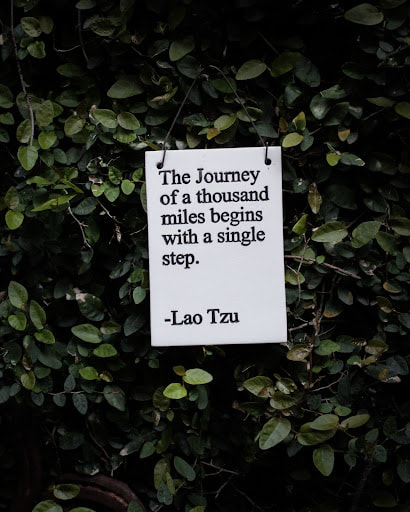|
Did you know that around 20% of the adult population could be considered chronic procrastinators? The statistics are frighteningly worse for HARD goals. In a recent study conducted by Forbes, 77% of people admitted to putting off starting a diet, which made them 8 times more likely to be unhappy with their weight. People often find it difficult to motivate themselves to make positive changes in their lives, especially when it comes to their health. When we're stuck in an all-or-nothing mindset, putting off wellness goals until Monday is all too tempting. However, doing so may have a detrimental effect on our happiness. Procrastination researcher Piers Steel from the University of Calgary found in reviewing hundreds of studies that putting things off doesn't lead to happiness. In fact, they overwhelmingly found among the procrastinators in their research that 94% believed procrastination actually hurt their happiness. You cannot wait for the right time, day, or goal to start transforming your life when procrastinating is causing you to be unhappy. Many of my new clients struggle with:
Change is more effective when made in small, sustainable steps instead of trying to make a huge change all at once. According to research, setting goals and holding yourself accountable to them can help you achieve the desired outcomes and avoid procrastination. By doing this, you can avoid the trap of never achieving your goals and ruining your own happiness. Here are some of my tips to help you get started: 1. Decide to Change Your Life Just like you, I was stuck in a continuous cycle of failure. I couldn’t wait until the day was over. It was hard to be happy when it felt like I wasn’t reaching my full potential. Then one day I decided to make a change. That’s the secret. You need to decide to make a change in your life RIGHT NOW. Otherwise, you will keep failing. Your journey to wellness doesn’t happen because you signed up for a gym membership and think about going. Life-changing transformation occurs when you make small, but significant changes to your daily routine. Change often takes courage, determination, and stepping out of your comfort zone to achieve personal growth. But once you have made the decision to change your life anything is possible. Here are some practical steps to get you started on your health goals:
2. Learn to Embrace Discomfort If you want to transform your life, you must be willing to step out of your comfort zone and dive headfirst into discomfort. After I became a dietician, I went on to pursue a master's in counseling so that I could help my clients bridge the gap between knowing and doing when it came to their nutrition. Eventually, this led to a setback, which allowed me to learn things about myself that I was unaware of before. I made small changes to my daily routine that helped me to get out of my comfort zone. And in this new experience, I realized my true calling and how I wanted to help people and make a difference. That’s when I started The Pointe an integrative, science-based nutrition and lifestyle support for busy women and men who want a no-nonsense approach to increased energy, improved mental health, chronic disease management, digestive support, weight loss, and overall wellness. Discomfort led to my complete transformation and helped me to start a new company where I feel happy and fulfilled in my work and daily life. Here are my tips to embrace discomfort and break out of your comfort zone:
Take a risk and step outside your comfort zone. There is no telling what you might find when you are out exploring. 3. Identify What’s Holding You Back In order to be successful in your health journey, it's important to identify what might be holding you back. Perhaps you’re…
As a working mom of 2, I understand the pressures of trying to balance your home life, career, and self-care. Although your journey to optimal health may not always be easy or straightforward, it is POSSIBLE. You just need to take the first step. Don’t let those setbacks I listed above be the reason you keep waiting until Monday to change your life. Ultimately, transformation happens when you decide to change your life today and make the decision to overcome the obstacles that stand in your way. 4. Sign Up For A Wellness Program
As a registered dietitian nutritionist and licensed counselor, I offer a well-rounded approach to the complex interplay between nutrition, mental health, and overall wellness.
If you’re looking to optimize your health and treat your chronic mental and physical health concerns while reducing stress and increasing energy & vitality that includes:
You’re in the right place. Our goal is to teach you how to bridge the gap between KNOWING and DOING! At The Pointe, we provide you with unmatched nutrition and lifestyle management plans that will teach you how to increase your sense of agency, push through barriers and limiting beliefs, and help you feel successful and in control of your mental, physical, and emotional health again. Whether that’s:
Don’t wait until Monday to make a transformational change to your wellness happen. Let's get started to make your turning Pointe TODAY!
0 Comments
Have you ever experienced sweaty hands before meeting on a first date? Or felt anxious about performing well in a job interview? Stress is a normal part of being human. It is a powerful force on our body affecting it both positively and negatively. There are two kinds of stress:
Let’s take a look at how stress affects our bodies and what we can do to keep our stress levels low and our lifestyle and overall health high. How Stress Affects Our Health Stress is also referred to as the "fight or flight response". When you’re placed into a stressful situation, your body responds automatically. Your brain releases the stress hormones, cortisol and adrenaline, automatically into your bloodstream. This causes numerous side effects:
This automatic response is completely normal. It's how our ancestors survived. However, today we aren’t likely to face the same threats as our ancestors. Instead, the stresses of daily life, paying bills, meeting deadlines, and juggling childcare, are what elicit the fight or flight response today. As a result, stress may be constantly stuck in the “on” position, which can have serious consequences for our health. Small, short-lived stress can affect your digestive system by giving you nausea before a presentation or a headache while arguing with your spouse. However, even these short-lived bouts of stress can still have a lasting effect on your body. Additionally, long-term activation of the stress response system can disrupt all of your body’s functioning systems. Moreover, it can leave you fatigued, unable to concentrate, and irritable for no good reason. Repeated stress can inflame the circulatory system and affect cholesterol levels, possibly leading to a heart attack. The longer the stress lasts, the worse it is for both your mind and body functioning. This is called chronic stress. Chronic stress puts your body at risk for:
Chronic stress can put you at risk mentally for:
Since chronic stress has such adverse effects on the mind and body, it's important to reduce your stress levels. Not only will it make you feel better right now, but may also protect your health long-term. 5 Ways to Manage Stress Fortunately, it is possible to relieve chronic stress and to keep yourself from activating the sympathetic nervous system when you don’t need it. 1. Identify What’s Causing the Stress. Keep a journal with you to help you monitor what causes you stress throughout the day. When you engage with the cause of your stress, write down exactly what happened, your thoughts, and your overall mood. Once you have identified the cause, you will be able to develop a plan to address it. This means setting realistic expectations for yourself and asking for help when you need it. 2. Create a Support System. Reach out to a close friend or family member that you have a strong relationship with and let them know what’s going on. Share your burden with them and welcome any guidance and support they give. They may also be experiencing the same challenges as you and be able to provide useful ideas and perspectives. No one needs to face their struggles alone. 3. Exercise Virtually any form of exercise can act as a stress reliever. Being active boosts your endorphins and provides a distraction from the stresses of daily life. Moreover, it improves your mood. Regular exercise can increase self-confidence, help you relax, and lower symptoms of mild depression and anxiety. Exercise can also reduce stress by providing your body with relief while imitating its effects. As a result, your body and its systems become more accustomed to working together. Furthermore, exercising can help protect your body from the harmful effects of stress, including those that affect the cardiovascular, digestive, and immune systems. Lastly, exercise can also improve your sleep, which is often disrupted by stress, depression, and anxiety. 4. Eat Nutrient-Dense Foods A healthy, balanced, and nutritious diet can help in numerous ways:
When you're too busy to cook when you get home, try meal prepping to ensure you're eating nourishing and healthy meals that support both your mind and body. 5. Get Between 7 and 8 Hours of Sleep Every Night Individuals who suffer from chronic stress often struggle with a lack of quality sleep. Here are some important steps you can take to ensure you’re getting the right amount of sleep:
Stress is an expected and normal part of being human, and it can even be beneficial in small amounts. A chronic state of stress, on the other hand, can be detrimental to your health.
You can relieve your mental and physical symptoms of stress by learning to manage it. A stress-management strategy can help you manage stress in a way that is effective and reduces its long-term harmful effects. Interested in learning more? Check out our services to learn how you can manage your stress and create a life you love! We all experience setbacks at some point in our lives. I recently overcame one... The demands of being a daughter, mom, and professional during COVID hit hard. When things finally calmed down, I wasn’t in a place emotionally, physically, or cognitively to set goals, be consistent, or make any commitments to myself. On the outside, it looked like I had it all. But on the inside... I was crumbling. It took everything in me just to make it through the day. After realizing what was happening, I knew I had two choices: keep spiraling, or break the cycle. I started to make small (but profound) shifts in my every day life that supported my mental, physical, emotional, and spiritual health. I learned how to ask for help and built a strong community that helped me be able to show up for myself, family, and friends in meaningful ways. In this blog post, I'm going to be sharing some of the top mindset shifts and wellness strategies that helped me overcome my setback and create a life I love. 5 Proven Ways To Overcome Obstacles & Create A Life You Love 1. Acknowledge Your Feelings and Process Them Whenever a hardship in life is thrown into your path, the most important thing is to take a break and process it. It’s human nature to want to automatically move into fixing mode. Oftentimes, we believe it is better to push through the pain without acknowledging our feelings. However, this can greatly hinder your healing process. When you deny or minimize your feelings, it becomes much more challenging to move forward. One simple tool you can use to process your feelings is to journal. Journaling can help you accept instead of judge your thoughts. This can result in fewer negative emotions experienced in response to stress. Writing down your thoughts can help you to express and explore your emotions in a safe and private space, gain clarity and perspective on your thoughts and experiences, identify patterns and triggers, and develop a deeper understanding of yourself and your emotional needs. 2. Learn From Your Setbacks Reframe the setback as a learning opportunity. You can learn more about yourself, your relationships, your values, and your impact on the world when you experience an obstacle. Here are some tips to use when you’re contemplating your setback and the reason behind it:
Ultimately, you should focus on what you can control rather than perseverate over things that are out of your control. This will help you reduce those feelings of helplessness and hopelessness. As a result, you can focus on what you can fix, and break tasks into manageable pieces that can be completed one at a time. This is an important building block in creating a life you love. 3. Plan Your Next Steps Once you have reevaluated your goals and set new ones, now is the time to take action. It's easy to get stuck in a rut, but if you’ve put in the work to acknowledge your feelings and learn from this experience, planning the next steps can help you move forward.
It's important to keep taking action toward your goals, even when it feels difficult or daunting. I suggest reading James Clear's book Atomic Habits: An Easy & Proven Way to Build Good Habits & Break Bad Ones to help you get started! 4. Prioritize Your Physical & Emotional Health When you're going through a difficult time, it's easy to lose lose momentum and fall back into old habits. However, taking care of yourself is crucial if you're looking to overcome the difficult situation you are in. Be sure to focus on:
Overcoming one setback will better prepare you for any future obstacles you may face. Here are my tips for building a healthy lifestyle that will help you overcome your setback:
5. Pay It Forward If you have experienced a setback that you once believed was impossible to overcome, think about how your experiences can be used to help those who are in a similar position. Small acts of kindness and support can make a big impact on someone's life. By giving back and helping others, you can turn your difficult situation into an opportunity to make a positive difference in the world. Here Are 10 Ways to Pay it Forward:
Every journey has setbacks, but they don't have to define you.
By acknowledging your feelings, reframing setbacks as opportunities, taking action, practicing self-care, getting support, paying it forward and continually learning and growing, you can overcome setbacks and create a life you love. I’ve experienced setbacks that kept me from living to my full potential. I’m here to tell you:
You have the power to create the life you desire. You just need to be brave enough to make it a reality. Let’s make today be your Turning Pointe! Click HERE to contact me today. I look forward to hearing how I can help you create a life you love. Tina Musselman |
AuthorTina Musselman, MA, LPC, RD, CLT ArchivesCategories |



















 RSS Feed
RSS Feed


